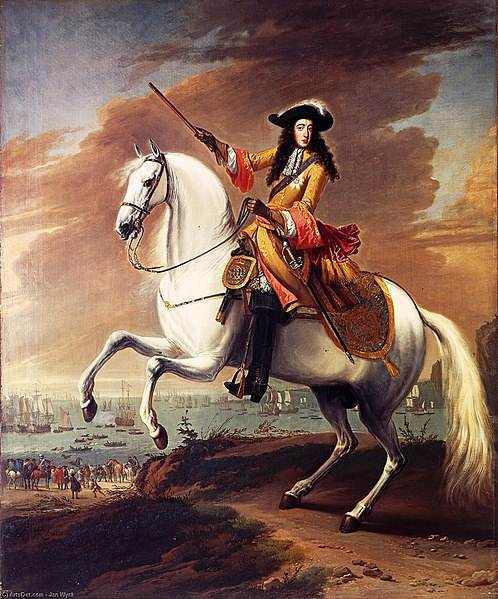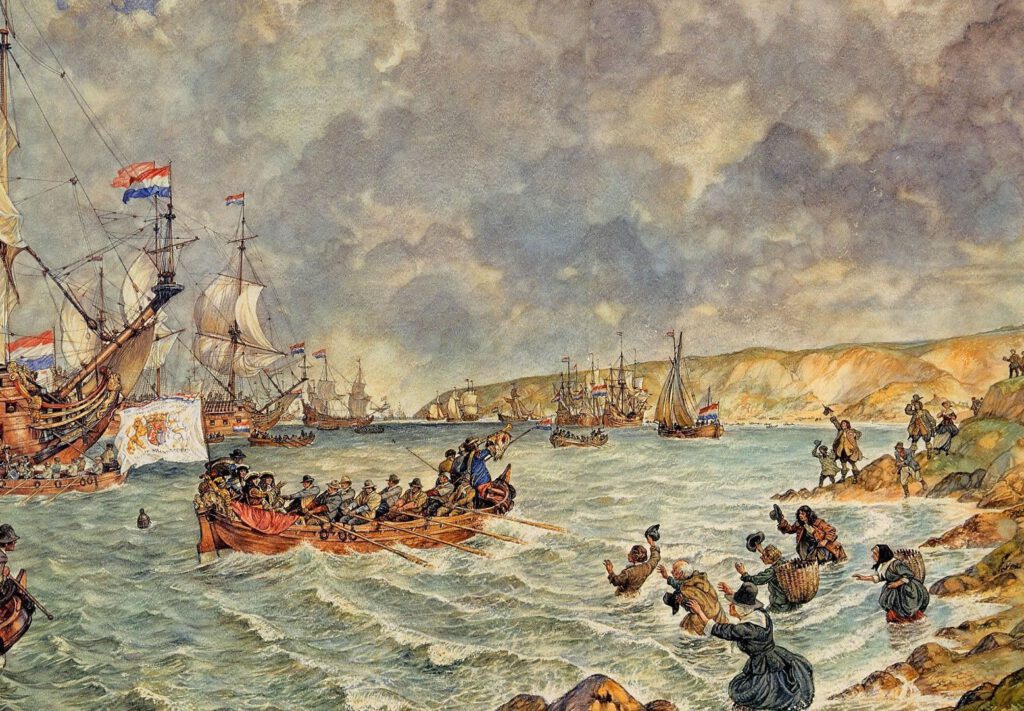You remember learning about the Glorious Revolution in history class, right? Us neither. Don’t worry; it’s not a blind spot in your education — it’s just how the Dutch refer to William of Orange’s ascension to the English throne.
They say that the victors write history, but in this series of events, it’s hard to tell who the victors were.
The Dutch portray the victor of the Glorious Revolution as William of Orange, who conquered England, Ireland, and Scotland when he and Mary II became British monarchs in 1689.
Of course, if you come from anywhere else in the world, you’re probably told a very different story — that this was an English-based coup with help from Dutch royalty. 😱
But who’s got right in their history books? It turns out there isn’t a simple answer to this question. Strap in, and let’s unpack this tale of deceit.
What do you mean the Dutch conquered the Brits?
So what the hell was going on in England that allowed for Dutch intervention? Well, it all comes back to everyone’s favourite topic: religion.
Like many parts of Europe at the time, England had been battling between Protestantism and Catholicism ever since good old Henry VIII.
READ MORE | Religion in the Netherlands: a perspective on the different religions in the country
In 1685, the death of Charles II left a power vacuum in England. His brother, James II, had become king but struggled to get his laws through a Protestant parliament.
Do you know who else was Protestant? You guessed it: the Calvinist stadhouder (head of state) of the Netherlands, William III of Orange, who happened to be married to Mary II, daughter of James II.

In England, the Anglican aristocracy wanted a monarch more willing to work with parliament rather than ruling by decree (which is what James had begun to do).
So, it devised a plot to put Mary and her Dutch husband William on the throne. This and the trial of the Seven Bishops were the final straws for parliament.
A Dutch king of England
Here we had a situation where a member of Dutch royalty was “invited” to overtake the English throne.
The parliament limited William of Orange’s power as an English monarch, being given equal status to Mary and bound by constitutional checks such as the Bill of Rights 1689.
Historians say this introduced the modern role of the monarch in British politics — all thanks to a Dutchman.
An invasion or a coup?
So far, it doesn’t sound much like an invasion. It wasn’t as clear-cut as the Raid on Chatham in 1667. William came for a little visit to England with an army of 15,000 in November 1688, taking over London with only a few skirmishes breaking out.

James fled to France in December, leaving the path clear for William and Mary to ascend to the throne in April of the following year.
However, it wasn’t as simple as William walking into Britain without resistance. England may have welcomed the new monarchs, but Scotland and Ireland took a bit more convincing.
The pro-Stuart revolts in both countries lead to a vast number of casualties. Not everyone was happy with the new heads of state. 😬
Pawn or plotter?
You can also debate how passive William was in this coup. You can paint him as a pawn in the game of the English aristocracy or as being a bit more strategic than that.
For example, some argue that he waited for a power vacuum in England before making his move — very ‘Game of Thrones’-esque.
READ MORE | Van hier tot Tokio: a history of Dutch-Japanese relations
On top of this, William also needed the English nobles’ support (especially regarding finances) to help him secure his position in Europe.
The Netherlands was a Protestant state surrounded by Catholic countries, making invasion a constant threat. The backing of the British meant he was ready to defend the Netherlands in future wars.
In this argument, William is an intelligent strategist rather than just a puppet of the English aristocracy.
So what do we make of this?
Whether it was a strategically timed intervention by the Dutch monarchy or merely the English making way for a more pliable monarchy, William’s ascension to the British throne certainly changed the nature of British kingship.
Since the Glorious Revolution, English monarchs have been much more tightly bound to constitutional restraints. It signalled a shifting view of how much power a monarch should have.
It also cemented Dutch-Anglo relations for years, which was inevitable for the two sandwich-loving, beer-drinking nations. 🍻
If you haven’t had enough of Dutch history and have five minutes to spare, this video sums up this series of events:
What do you think? Was it an invasion or a cooked-up coup? Let us know in the comments below!




The Netherlands weren’t a monarchy at that time, it became a kingdom after Napoleon. William is called the Stadhouder-Koning in our history books.
Even British historians start acknowledging that Stadtholder Willem III took the initiative and asked to be invited to make it look less of a foreign invasion and conquest. The whole invasion was a cunning propaganda campaign to avoid bloodshed and costs anyway. The planning of the invasion started well before the ‘invitation’. Allthough Willem is known to have complained that he felt like the Stadtholder of England and the king of the Netherlands for having to deal with the parliament, the fact is that he had London occupied with Dutch soldiers and no English troops were allowed near London. So how could he be forced to accept any terms? He just honoured the deal and his own propaganda that saved him so much battling.
In the end it only resulted in England becoming more like the Dutch Republic, which had known shared power for a century and the bill of rights did not contain much the Dutch hadn’t enjoyed since the charter of Kortenberg. Not a big deal since the man was busy saving protestantism and religious tolerance from the evil catholic absolutists.
And that’s why we have tall people
Hi, we learned at Dutch hyshool all highlights of Dutch history, but now 65 of age I read en see all these again on the net, there is so much info about the hate and love relation between the Dutch and the English, but do not forget mostly triggered by only small amount of people. What I do not understand and did not find, why the English do have words in their language which made the Dutch make bad like Dutch uncle Dutch wife, going Dutch etc., who is responsible for this fenomenom and when started it?
While the Dutch are so related with the English being family and in my opion should it be Great Britain consist including the Republic / kingdom of the Netherlands, or England, Scotland, Ireland as provinces of the Netherlands, none of them exist.
Hi Chloe, here Joana again, about an invasion of the Dutch…, Willem and Mary were married, so I guess Mary did persuade Willem to come over, and it’s true The Dutch were surrounded by Catholic Nation, the 80 years war against Spain, also most important Calvijn influence in Dutch society which is still today important, the Dutch are modest people.
Then was it an invasion…., yes you can say so, but meaby a strategic wending present for Mary…
, was it an invasion…., yes the next link is important
https://nl.m.wikipedia.org/wiki/Slag_aan_de_Boyne.
I was told by an Scotsman when you asked an Englishman when the last invasion was…, I have to asked about uhhhhhh the battle on the Boyne.
in my opinion in England it was not felt as an invasion because Mary was the trigger, but to make Great Britannia Scotland and Ireland has to be ‘ conquere’ as said in the given link.
The most important is that all people in the world do have free will of speech and decisions are made democratically, and by 1 person like we do have today with Poetin.
So it was an invasion after all.
Joana